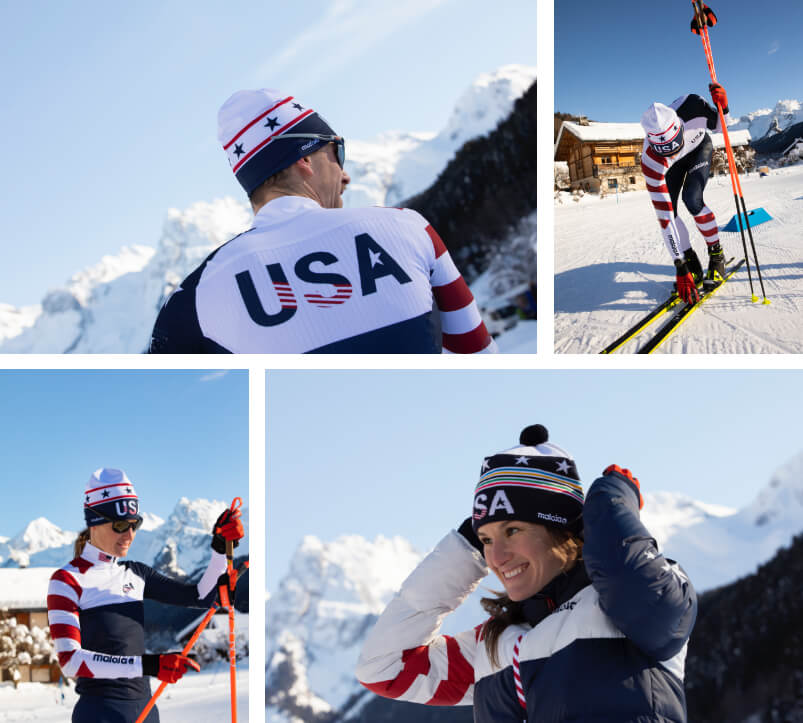THE UNDERDOGS
IN BIATHLON
Fate is a powerful word. But when someone falls into a sport against their will, and when members of the U.S. Biathlon team speak in a broad Bavarian accent in Stockholm and two underdogs inspire each other, then you can, just once, speak quietly of fate.
SHOP THE COLLECTION
Perseverance, technique, precision. Cut, wax, materials. Body and mind. For a biathlon, everything needs to be in alignment. The biathlon is a demanding sport. One of the craziest, and one of the most heart-pounding. It’s precisely this reason why Clare Egan chose this sport. The U.S. biathlete loves the challenge and lives for its versatile nature.
Clare generally draws her strength from variety. She is multi-talented: a top 20 runner, chairperson of the IBU Athletes’ Committee, and a student of linguistics. She speaks six languages. Clare has an active mind, which isn’t necessarily an advantage in a sport that’s so mentally challenging. You can’t let any self-doubts creep in—not cross-country, and definitely not at the stall. It’s about having a firm belief in your own abilities. And that, says Clare, is certainly not that easy to maintain when you’re the underdog.

A team with character
The U.S. are the David of biathlons. The ever-successful Scandinavians, Germans, and French are the star Goliaths in their home nations. The U.S. biathletes can only dream of reaching such heights. Still, they bring plenty of ambition and passion, while being just the right level of easygoing and fun. The Americans are well-loved in the biathlon arena, but it doesn’t win them any medals.
“The other teams have their branded cars, and we always came in some cheap rental wagon,” Clare says. “Our entry was anything but professional.” Until 2018, when a small Bavarian brand became the clothing sponsor of the small U.S. team.

Since November 2018, the U.S. team have competed in Maloja clothing. And since then, the team have (literally) been in a different position.
“It might sound funny now, but having Maloja as a sponsor really changed us. It was a boost to our self-confidence, to our self-image as a team. Suddenly we were working as one, being perceived differently, and standing out. People were always talking to us about our clothing. Us outsiders were suddenly wearing things the top teams wanted to wear.
Maloja even organized a car for us later on with professional branding. It did a lot for our mindsets and our self-perception, and even helped contribute to our performance in the sport.”
How it all started
But how did the two underdogs team up? To answer that, we have to go back to the year 2013. Peter Räuber, co-founder of Maloja, was forced to give up snowboarding. Sports-wise, the rug was pulled from under his feet. Peter suffered. It was George “Schorsch” Catrici who painstakingly put him back on track. His friend “Schorsch” was a defining figure in Peter’s life. The Romanian-by-birth was his major sports role model, except for the whole thin skis thing. Schorsch baited Peter with some carbon cross-country skis. Peter smiled wearily and replied how any cool snowboarder would’ve replied: “You can go hang with your cross-country skiing.” But Schorsch remained persistent. At some point, the combination of Schorsch’s stubbornness and the urge to get moving became too much. Peter tormented himself, and noticed how little strength was needed and how crucial the complex technology was. Peter’s ambition grew. He started to train, honed his skiing style, and fell into the sport.
In 2016, Schorsch, who had since become the head of the Moldova Ski Team, took Peter with him to the Biathlon World Cup in Östersund. He only complied against his will. He didn’t like traveling. But his friend was severely ill. For years, Schorsch had been battling cancer. Peter wanted to be by his friend’s side and accompany him on what might have been his last trip. He used those days in the far north to meet the Swedish national team, who were on the lookout for a new kit provider. While they got on well, the major Swedish team’s visions stretched well beyond the small Bavarian brand’s budget.
Bavarian Connection
On the journey back, Peter picked up some familiar words at Stockholm Airport. Two men in U.S. Biathlon clothing were sitting opposite, chatting in the finest Bavarian. Peter talked to the “US boys.” They weren’t actually American, the two of them replied, but Bavarian fit well with the U.S. Biathlon spirit—and Maloja would, too. An extraordinary brand needed an extraordinary team. And that was the U.S. biathletes. Underdogs with a huge passion for the sport, a huge fighting spirit, and a huge lust for life.
They introduced themselves. Bernd Eisenbichler, active in the U.S. Biathlon Association since 1999, was the Chief of Sport.
Christian Schieler was a physio and ski technician for the U.S. team. Sometimes things are that easy. Or obvious. The following Monday, the president of the U.S. biathletes Max Cobb was standing with Bernd in a converted barn in Rimsting near Chiemsee—the home of Maloja. It quickly became clear that the small U.S. team would be wearing Maloja in future. In the huge biathlon arena, two underdogs had found each other.



